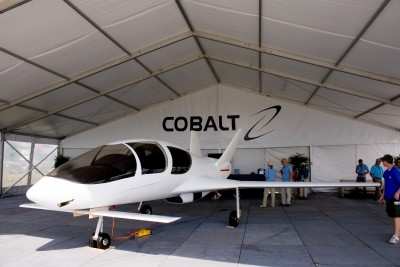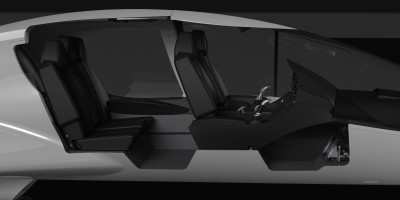Wed, Jul 28, 2010
A New French Entry Into The Single-Engine 4-Place Business
Arena
By Geoff Sobering
Cobalt Aircraft of Toussus-leNoble, France brought their
prototype Co50 aircraft to AirVenture. The Co50 is a single-engine,
canard, airplane targeted at the US business market. The Co50's
planned $650k price places is solidly in the same niche as the
SR-22 Turbo, DA-50, and similar aircraft. The Co50 has 4+1 seating,
accommodating four adults with the rear-seat center arm-rest usable
for a child. The cockpit has side-sticks and a single-lever FADEC
throttle with a mechanically programmed propeller linkage with a
"best power" and "best economy" selector. Power is provided by a
twin-turbocharged TCM TSIOF-550-D2B producing 350 hp, driving a
Hartzell three-blade aluminum propeller. Cruise speed at 75% power
is expected to be 220 kn, with a best-efficiency cruise of 202 kn
at 55% power. Maximum range is predicted to be 1150nm with a
ceiling of FL250.

Cobalt Prototype
The first flight of the prototype is scheduled to start in the
late fall of this year, with certification starting by the end of
2010. The Co50 will be initially certified with the FAA, but it has
been designed to meet EASA requirements for European certification
in the future. FAA certification is expected to take two years,
with a first customer delivery in about two and one-half years.
Marcellette Cloche, of the Cobalt marketing department, emphasized
that their business model is not predicated on large number of
initial orders or sales. She went on to say that Cobalt is not at
AirVenture looking for orders, but mostly to raise awareness of the
airplane in the GA community. Cobalt is also looking for US
distributors. Production will be in the US, although the plant
location has not been determined.

3+1 Seating Configuration
The structure of the Co50 is different that the typical
stressed-skin monocoque structure. A spine of carbon-fiber and
structural-foam takes the main loads from the wing spar, rudders,
and engine. The fuselage is therefore a much lighter fiberglass
structure with only one ring-frame aft of the doors and bulkhead
behind the cabin. This design contributes to the 1874 lb empty
weight, and the 1213 lb useful load. Instead of the usual
wing-tanks, all the fuel is carried in one tank below the cargo
area. This simplifies both the wing structure as well as plumbing
and fuel management.
FMI: www.cobalt-aircraft.com
More News
“While legendary World War II aircraft such as the Corsair and P-51 Mustang still were widely flown at the start of the Korean War in 1950, a new age of jets rapidly came to >[...]
Decision Altitude (DA) A specified altitude (mean sea level (MSL)) on an instrument approach procedure (ILS, GLS, vertically guided RNAV) at which the pilot must decide whether to >[...]
Aero Linx: National Aviation Safety Foundation (NASF) The National Aviation Safety Foundation is a support group whose objective is to enhance aviation safety through educational p>[...]
Also: Cal Poly Aviation Club, $$un Country, Arkansas Aviation Academy, Teamsters Local 2118 In response to two recent general aviation accidents that made national headlines, more >[...]
“The FAA is tasked with ensuring our skies are safe, and they do a great job at it, but there is something about the system that is holding up the medical process. Obviously,>[...]
 Aero-News: Quote of the Day (04.28.25)
Aero-News: Quote of the Day (04.28.25) ANN's Daily Aero-Term (04.28.25): Decision Altitude (DA)
ANN's Daily Aero-Term (04.28.25): Decision Altitude (DA) ANN's Daily Aero-Linx (04.28.25)
ANN's Daily Aero-Linx (04.28.25) Airborne-Flight Training 04.24.25: GA Refocused, Seminole/Epic, WestJet v TFWP
Airborne-Flight Training 04.24.25: GA Refocused, Seminole/Epic, WestJet v TFWP Aero-News: Quote of the Day (04.29.25)
Aero-News: Quote of the Day (04.29.25)




